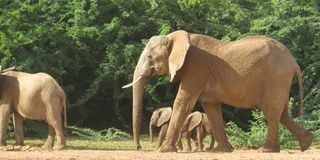Twin baby elephants missing since birth found

The twin baby elephants with their mother in Samburu East. The calves have been found alive and healthy after missing since January 16
Twin baby elephants that had been missing for two months since their delivery in January have been found alive and healthy.
Research and protection organisation Save the Elephants announced on Wednesday that the calves had not been seen since January 16, when they were first spotted with their mother Bora, leaving conservationists in the park pondering their fate.
The rare twins, a male and a female, were first spotted two months ago in Samburu County and were the first twin elephants to be born in the park in almost 16 years.
In a statement, Save the Elephants said the miraculous calves were spotted for the second time with their mother in a remote area outside the Samburu National Reserve.
In what surprised conservationists, the twins appeared healthy and had even put on more weight, “an amazing feat considering Kenya is still in the grip of a crippling drought” and twins rarely survive in the wild.
"The rare African elephant twins born in Samburu National Reserve, two months ago, have surprised conservationists by turning up alive and well, all thanks to the expert skills of their mother, an African female elephant - Bora," Save the Elephants said in a statement.

The twin baby elephants with their mother in Samburu East. The calves have been found alive and healthy after missing since January 16
David Daballen, the head of field operations at Save the Elephants, said twin elephants rarely survive and that they were looking forward to monitoring their progress.
“This is such incredible news. Despite the terrible drought, Bora has managed to feed the babies and keep them alive,” he said.
“Twin elephants rarely survive so we are absolutely delighted with this news. It just goes to show how resilient elephants are and what wonderful mothers they make. We look forward to monitoring their progress.”
Normally, elephant mothers do not have adequate milk to feed twin calves, which makes one die if not both. For instance, the last twins born in 2006 in the Samburu National Reserve died shortly after birth.
The chance of an elephant having twins is around one percent, according to the Society for the Protection of Animals Abroad (SPANA).
African elephants are pregnant for up to 22 months, while their Asian relatives are pregnant for 18-22 months, making it the longest gestation period of all mammals.
The research organisation says elephants give birth around every four years. Although elephants can live for 60-70 years, they typically only have about four or five babies during their lives.





